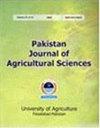恶氨酰和百恶唑对5种土栖掠食性螨的毒副作用评价
IF 0.6
4区 农林科学
Q3 AGRICULTURE, MULTIDISCIPLINARY
引用次数: 2
摘要
在严格的实验室条件下,测定了恶氨酰和噻虫唑对5种土栖掠食性螨狐(蜱螨亚纲:刺螨科)、白绒螨(蜱螨亚纲:刺螨科)、玫瑰红达螨(蜱螨亚纲:刺螨亚纲)、家蝇大螯螨(蜱螨亚纲:刺螨亚纲)和小恙螨(蜱螨亚纲:刺螨科)的毒副作用。在三种不同浓度(推荐剂量的一半(HRD)、推荐剂量(RD)和推荐剂量的两倍(DRD))下,oxamyl和hymecazol均能显著杀死上述5种掠食性土壤螨。除玫瑰螨种群减少27.80%外,肟胺对5种掠食性土壤螨的毒性均大于噻虫唑,对5种掠食性土壤螨的毒性均大于噻虫唑。此外,施用恶氨酰可使5种掠食性土壤螨在RD时的种群数量减少约80%,而在DRD时则有总死亡率。总之,本研究提供的证据表明,即使在暴露于一半推荐剂量的恶氨酰和噻虫唑后,五种掠食性土壤螨的种群数量也有所减少。因此,应采取预防措施,以保持可持续性,避免扰乱生态系统的自然平衡本文章由计算机程序翻译,如有差异,请以英文原文为准。
EVALUATION OF THE SIDE EFFECTS OF OXAMYL AND HYMEXAZOL ON FIVE SPECIES OF SOIL-DWELLING PREDATORY MITES
Side effects of oxamyl and hymexazol on five species of soil-dwelling predatory mites, Lasioseius dentatus (Fox) (Acari: Ascidae), Androlaelaps casalis (Berlese) (Acari: Laelapidae), Rhodacarus roseus (Oudemans) (Acari: Rhodacaridae), Macrocheles muscaedomesticae (Scopoli) (Acari: Macrochelidae) and Cunaxa setirostris (Hermann) (Acari: Cunaxidae) were tested under stringent laboratory conditions. Both oxamyl and hymexazol were found to drastically kill all five predatory soil mites listed above at three different concentrations (half of the recommended dose (HRD), recommended dose (RD) and double the recommended dose (DRD). Oxamyl was found to be more toxic than hymexazol to all five predatory soil mites as it could reduce their population by > 40% at the HRD, except R. roseus, as its population was reduced to 27.80%. In addition, the application of oxamyl can decrease the population of five predatory soil mites by >83% at RD while at DRD a total mortality rate could be seen. In conclusion, this research study has provided evidence which highlights the reduction of population of five predatory soil mites even after the exposure to half of the recommended dose of oxamyl and hymexazol. Therefore, precautionary measures should be taken to maintain the sustainability and to avoid disturbing the natural balance of the ecosystem
求助全文
通过发布文献求助,成功后即可免费获取论文全文。
去求助
来源期刊

Pakistan Journal of Agricultural Sciences
AGRICULTURE, MULTIDISCIPLINARY-
CiteScore
1.80
自引率
25.00%
发文量
18
审稿时长
6-12 weeks
期刊介绍:
Pakistan Journal of Agricultural Sciences is published in English four times a year. The journal publishes original articles on all aspects of agriculture and allied fields.
 求助内容:
求助内容: 应助结果提醒方式:
应助结果提醒方式:


